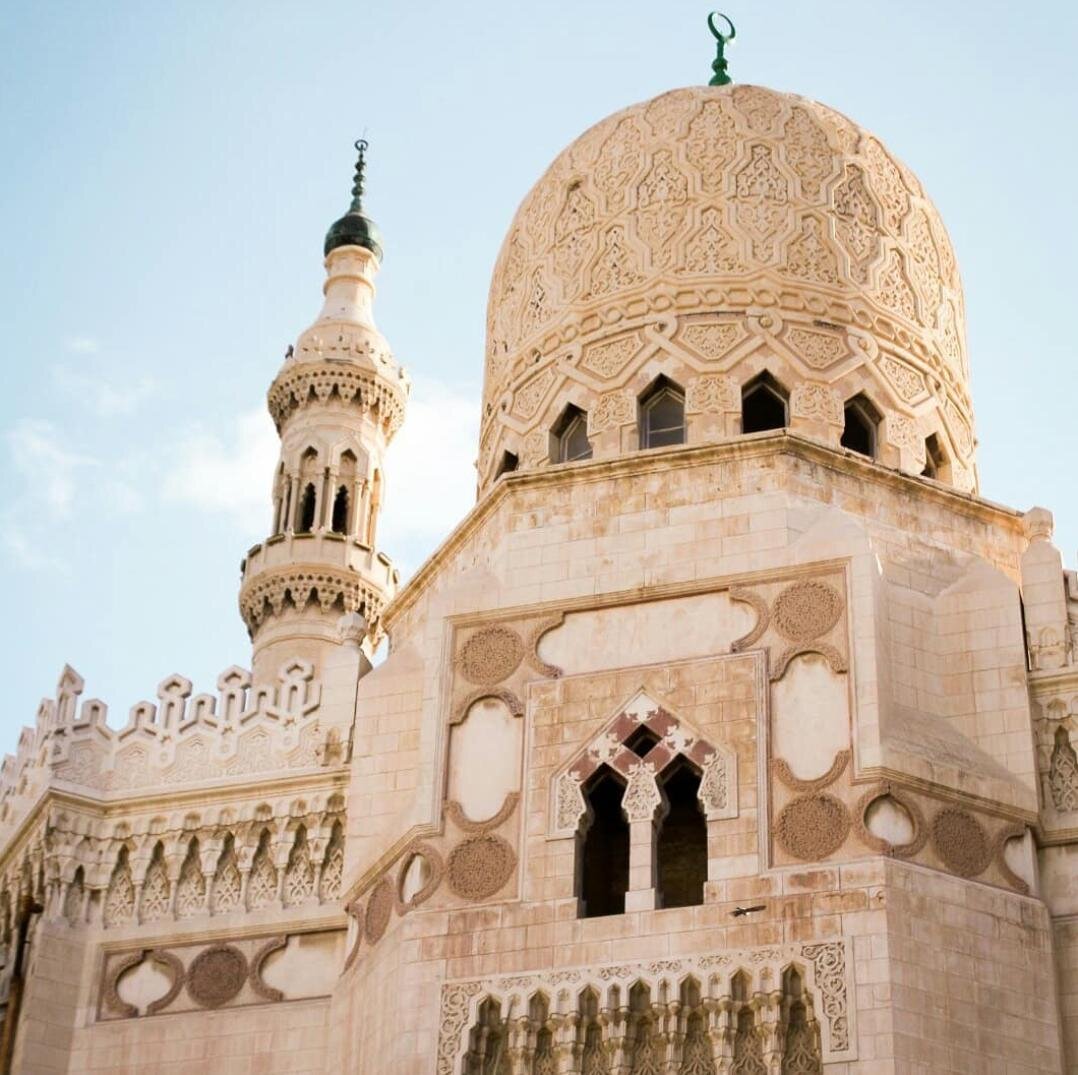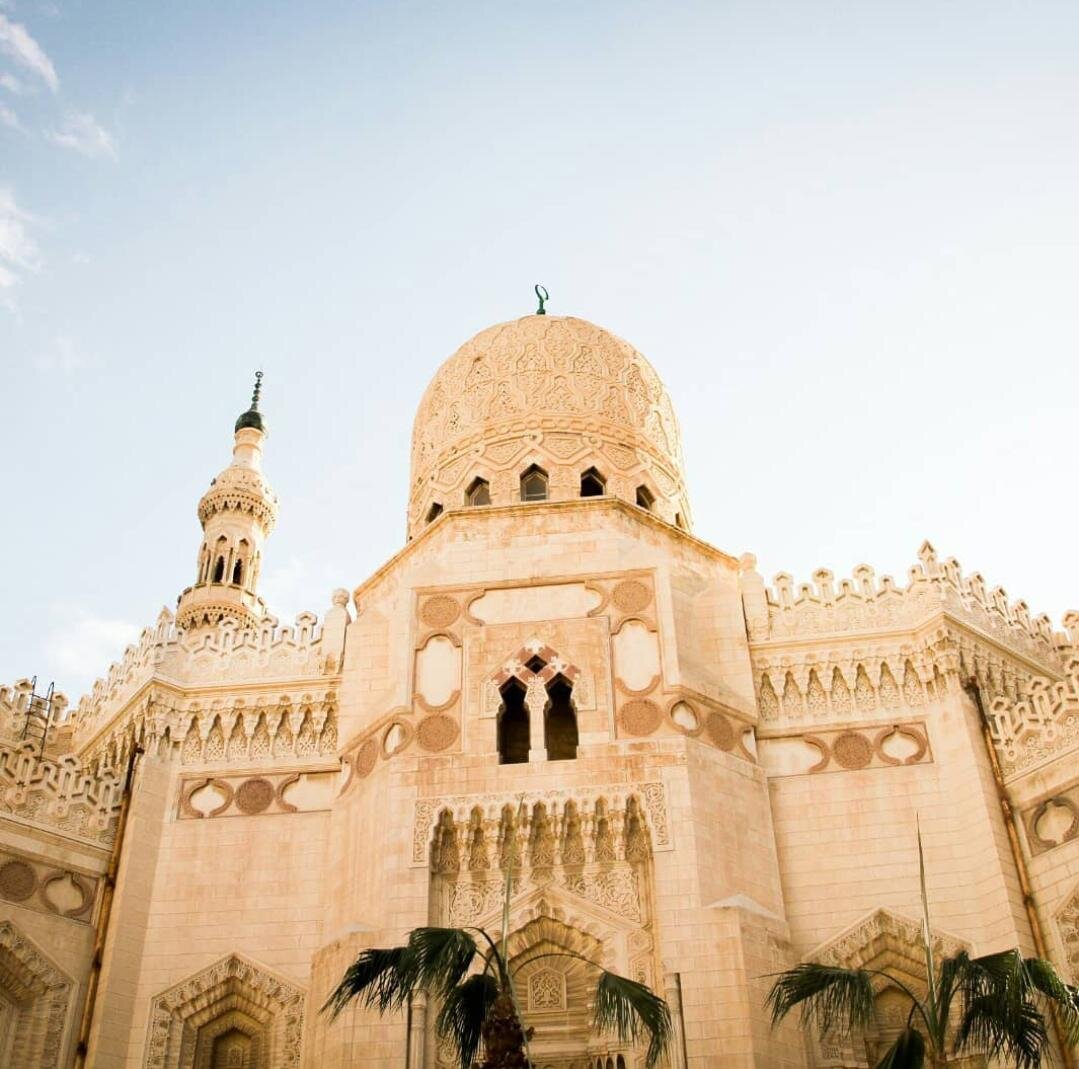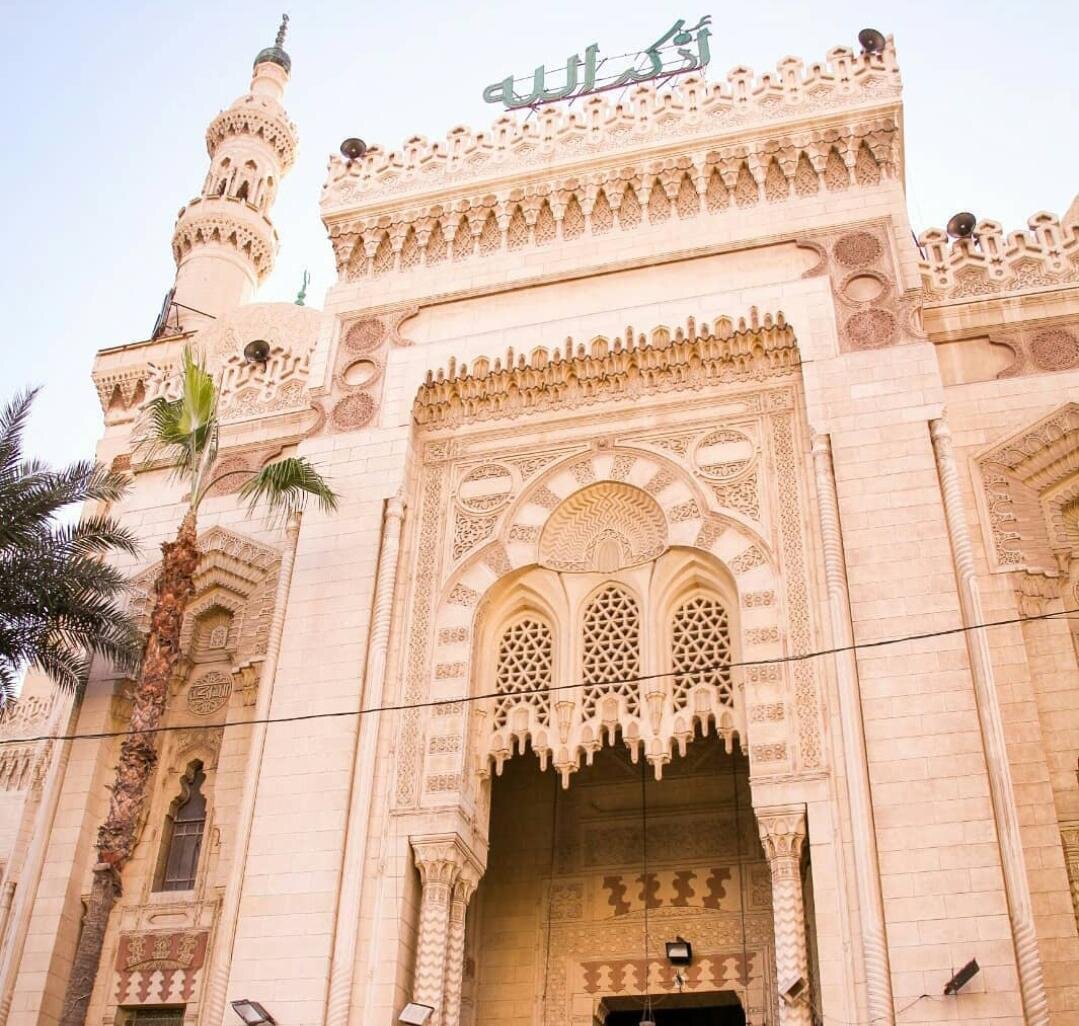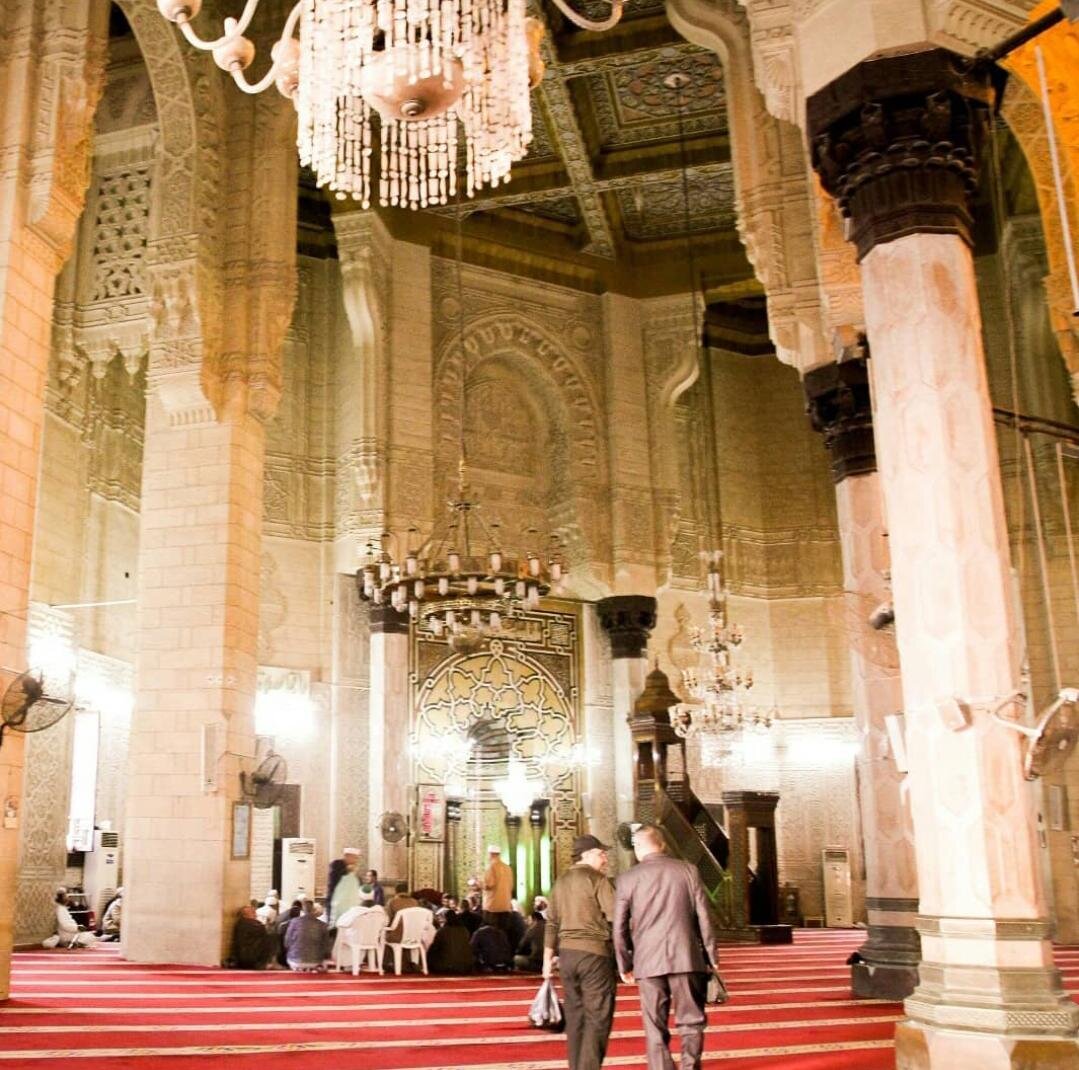Sidi Abul Abbas al-Mursi ash-Shadhili ق, the successor of Imam Shadhili ق
Sidi Abul Abbas al-Mursī ق was the successor of Imam Abul Hassan ash-Shadhili ق for the sublime Shadhili tariqah. Imām Abū al-Hassan ash-Shādhilī ق said: "When I pass on, stick to Imam Abul Abbas al-Mursī ق for he is more familiar with the ways of Jannah than those of this earth.” Sidi Abul Abbas al-Mursī ق says of his spiritual master: "He taught me 40 disciplines regarding the sciences of the Deen; the ocean without a shore he was!"
Among his famous teachings are: “One’s righteousness lies in three things:
1) Knowing Allah. If you know Allah, you shall respect Him;
2) Knowing yourself. if you know yourself, you shall be humble;
3) Knowing the world in which you live. and if you understand the world, you won't yearn for it.”
Lineage
Sidi Abul Abbas Ahmed ibn Umar ibn Ali al-Khazraji al-Mursi ق was born in the year 616 AH in the Spanish city of Murcia, which is where his name al-Mursi comes from. His paternal lineage goes back to the Ansarites of Medinah whose love for the emigrants was their greatest expression of faith as the Emissary of Allah ﷺ described. The Khazaraj tribe leader Sa’ad bin Ubada is part of his noble ancestry.
Early Life
When Sidi Abu al-Abbas ق reached adolescence, he grew firm in his understanding of jurisprudence he went into the trading business together with his father establishing a name as one of the most trustworthy merchants around. In the year 640 AH, his father took matters into his own hands and willed for the family to set out on the journey of pilgrimage to the Holy House of Allah. Together with his family they took ship at the red sea when divine providence took its course and a violent storm struck the ship near the coast of Boona. The shipwreck cost the lives of his parents, which are considered martyrs since they died as travellers on the sea. As for Sidi Abul Abbas ق and his brother they survived the storm and found haven in nearby Tunisia. His brother took up trading at the dismay of his deceased father, however Sidi Abul Abbas ق left his trade and instead dove back into an intensive study of the Qur’an at a Tunisian Zawiya (Sufi lodge) called Mihriz bin Khalaf. It was there where he met his predestined Imam Abul Hassan ash-Shadhli ق and set out on the path to become a Qutb. One might say that this series of events was necessary to bring him to Tunisia in order to become the rightful next successor of the Shadhili Sufi path.
Discipleship
Soon after, Sidi Abul Abbas ق travelled with Imam Abul Hassan ash-Shadhili ق and a group of his followers to Egypt, arriving in Alexandria in a state of exhaustion and hunger. They were welcomed by a dignitary of Alexandria with a meal. When Imam Shadhili ق was informed of this, he ordered his followers not to eat anything from it yet. Following his order, they spent the night in hunger. After leading the dawn prayer he turned towards them and finally allowed them to eat of the given meal. Imam Shadhili ق later revealed his reasons by explaining that not knowing the source of the food made its permissibility uncertain and refrained from inquiring since he did wish to offend him. That night, he had a vision where a voice told him that the food was permissible by virtue of their struggle to maintain courtesy.
Sidi Abul Abbas ق remained in the company of Imam Shadhili ق learning the way of the Sufi, acquiring good character and learning the litanies. When Imam Shadhili ق returned to his Lord, Sidi Abul Abbas ق was appointed the rightful successor of his teacher. He became known as a spiritual guide and was loved especially by the common people. The scholars, at first reluctant towards his station as a spiritual guide, were nevertheless convinced after experiencing his miracle of initiating thirty government judges into the Sufi path by his hands. He used to say to Shaykh Yaqut al-A’rshy that the matter is not about ‘initiating one thousand laymen everyday but it is to initiate one scholar every one hundred years.’
His methods as a teacher were marked by balance and moderation. He never forbade, for example, a student to wear beautiful garments as long as his intentions stayed within the limits set by Allah. He followed the advice of his teacher Imam Shadhili ق when he said:
“My son, drink your water cold since if you drink it hot and then praise Allah you would have said it without concern and if you drink cold water and praise Allah, all the members of your body would have responded with praise to Allah.” The origin of this proverb goes back to Allah’s words about Prophet Musa (as). “So he [Prophet Musa] fetched for them water then turned to sit under the shade and said, “O Allah, I am in dire need for thy blessings you have given me.” Do you not see how he went to the shade first before he expressed his gratitude?
His Guidance
Sidi Abul Abbas ق was known to be very considerate about the spiritual states of his fellow men. He used to say, “Allah hears all and Allah gives everyone understanding in accordance to their capacities.” It is enough in this regard to know that three different people heard three different things from a single caller saying “Ya Za’atar Birry” (O Za’atar, my benevolence!). The first heard “struggle and you will find my benevolence,” the second heard “this hour you will see my benevolence” and the third heard “Is there anything more expansive than my benevolence.”” The statement being heard is one, but the understandings of the listeners are many. As for the first one, he was a novice aspirant who saw that his ascension to Allah would be through actions in order to be considered seriously treading the path. So he heard “Struggle toward us with truthfulness in action and you will find our benevolence with your perseverance.” As for the second one, he was in the stage of sulook (travelling) and the stage seemed to take a long time so he feared that he might not reach the goal so he heard with the aim of calming his doubts “This hour you will see my benevolence.” As for the third listener, he was an enlightened gnostic and it was revealed to him the wide meaning that the words carry so he heard what he witnessed directly “How expansive is my benevolence.”
This idea of a multitude of interpretations coming from one expression is strikingly affirmed in Allah’s narration of the story of the tribes of Israel when following Nabi Musa (as) into the desert. At a certain point, Nabi Musa (as) was ordered to strike a rock causing water to gush forth into different streams whereupon Allah says: everyone knew of which stream to drink.
Aside from being sensitive about the specific spiritual states of the people around him Sidi Abul Abbas ق was also very concerned with how he spent his time. For him one’s time can be seen as one of four types: The time that one is in blessing, the time that one is in tribulation, the time that one is in obedience, the time that one is in disobedience. He said in this regard: “As Allah is witnessing you in all those times, there is a response in all those times that Allah expects from you. As for the one who is in the time of obedience, then his response should be one of witnessing the favor of Allah that has allowed such a state and caused such circumstances. As for the one who is in the time of disobedience, then his response should be one of asking forgiveness and turning back to Allah. For the one who is in the time of blessing, then his response should be gratitude and for the one in the time of tribulation, then his response must be contentment and patience with what has been ordained. The Emissary of Allah ﷺ said, “the one who has been given blessings and expresses gratitude, the one who has be tried and remained patient, the one who has been oppressed and pardoned, and the one who oppressed and asked forgiveness…” and remained quiet so the companions asked “then what O Emissary of Allah ﷺ?” Heﷺ replied, “those are the ones who have security and those are the guided ones.”
Sidi Abul Abbas ق used to say: ” The Prophets in relation to their communities were aids and our Prophet [Muhammad] ﷺ in regards to his community [us] is a gift. It is critical to understand that an aid is for the ones in need and a gift is for the ones who are loved. It is for the same reasons that the Prophet ﷺ used to say “I am a mercy that has been gifted [to all mankind].”
He also explained the saying of our Master and Messenger of Allah ﷺ, “I am the Sayyid of the sons of Adam [and I say it] without boastfulness.”, as meaning that he did not boast with this leadership title but instead he was emphasizing his perfection in worship of Allah. His understanding was that it is not necessary that the Qutb be a Shareef in lineage but that he could be from another lineage.
Sidi Abul Abbas al-Mursi ق returned to his Lord in the year 685 AH.




